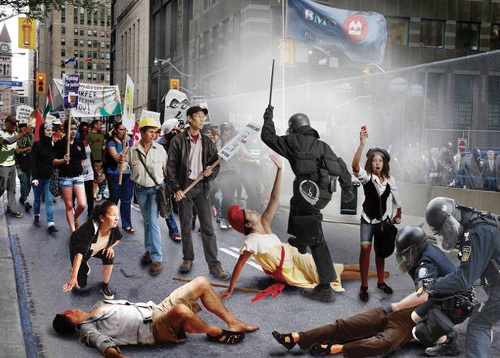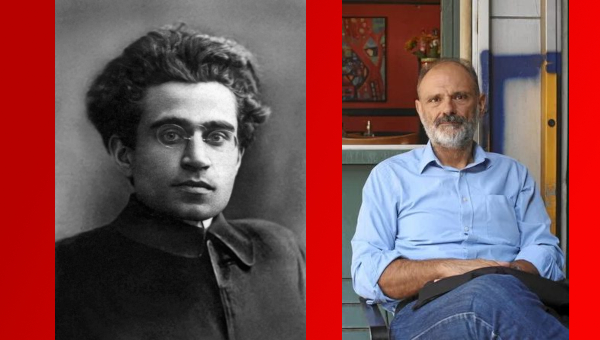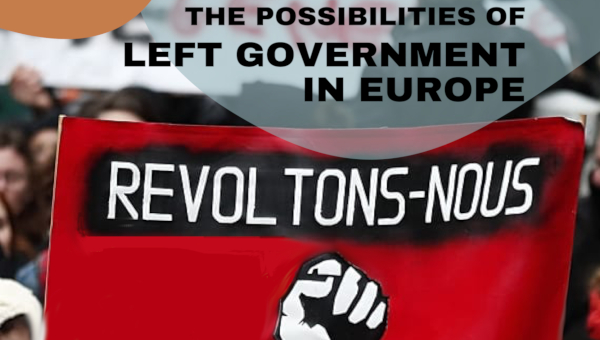There has never been more talk about human rights than there is today. Social media is full of calls to sign petitions or send e-mails about human rights causes. Almost no one says they’re not supporters of human rights, from radicals on the left to people on the hard right like Stephen Harper. Governments of Western countries justify war in the name of defending human rights. We now have a Canadian Museum for Human Rights in Winnipeg.

Defending human rights is necessary. But championing human rights is a completely inadequate way of responding to the biggest crises of our times: the ecological crisis – above all, climate change – and socio-economic crises.
What Are Human Rights?
There’s nothing natural about rights – they’re human-made. Enforceable rights are those enshrined by governments in the laws of states. In the Canadian state, we have the Canadian Charter of Rights and Freedoms and human rights codes.
There are three kinds of rights. Civil rights include protection for free speech, thought and assembly, the right to own property and rights to security of the person, to access justice and to equal treatment under the law. Political rights – the rights of citizens – include the right to vote, to be elected and to leave, return to and remain in a country. Social rights include rights to access healthcare and education, to be paid a minimum wage, to refuse unsafe work, to form unions and to strike.
One of these rights is inherently bad for humanity: the right of individuals to hold parts of the earth’s wealth as private property. Most other rights are good for human well-being. However, they can be put to bad uses. For example, states can invoke universal human rights against the right of indigenous peoples within their borders to determine their own futures, or against the rights of people who practice a particular religion – we see this today in cases of measures by states that target Muslims.
Governments also use rights talk to justify wars whose real aims have nothing to do with defending human rights – today’s war being fought in Iraq and Syria by the U.S., Canada and other countries against the Islamic State is a prime example.
We also need to remember that although citizenship is often thought of as inclusive, it’s actually exclusionary. States grant rights to citizens (and sometimes to other residents) but deny them to non-citizens. Here in Canada, people working under the Temporary Foreign Worker Program are denied many rights, including the right to change employers, attend post-secondary education and remain in the country.
Canada
A wide range of civil and political rights are enshrined in Canadian law. Courts have often interpreted the Charter of Rights and Freedoms (part of the constitution of 1982, which has not been signed by Quebec because it fails to recognize Quebec’s status as a nation) in inclusive ways, for example by striking down laws that prevented people of the same gender from marrying. However, social rights in Canada are much weaker, with the right to access hospital care and doctors’ services being one of the most important and widely supported.
Yet it isn’t difficult to see that human rights don’t solve many problems. For example, there is no law in Canada that restricts the right of women to end pregnancies if they so choose. This is a situation that deserves to be celebrated and its origins remembered: a mass pro-choice movement created a political climate in which the Supreme Court of Canada struck down the legal restrictions on abortion in 1988 and which the Tory federal government of Brian Mulroney failed to recriminalize.
Nevertheless, access to abortion is limited. Women in rural areas and small urban centres generally cannot access abortion services near where they live. Less than 20 per cent of hospitals provide abortions. The government of New Brunswick refuses to fund abortions done in private clinics even though this policy is against the law. Abortions are not available in Prince Edward Island. Clearly the right to have an abortion doesn’t actually give women access to abortion.
Another example of the limits of human rights is seen with sexual assault and violence against women (which, we should remember, is an especially severe threat to indigenous women). Such violence is a violation of human rights and obviously illegal. It’s also widespread in our society, which has what some dub a rape culture. Similarly, the Charter and human rights codes declare that racial discrimination is illegal and yet racist practices by employers, police and landlords are common.
Rights were trampled on a huge scale during the protests against the G-20 summit in Toronto in June 2010. The Charter guarantees protection against unreasonable search and seizure and arbitrary detention. It upholds the freedom of peaceful assembly. In spite of its fine words, police carried out mass arrests, including 740 people arrested for the dubious offence of breach of the peace. Many were illegally held without charge for over 24 hours, in terrible conditions.
Often those arrested were not even told why they had been arrested. Access to lawyers was frequently delayed or denied. Many of those arrested endured racist, sexist and heterosexist treatment by police. Before the protests had even begun, a number of organizers were harassed at their homes or workplaces. Some were arrested, charged and released with extremely tight conditions.
All this was conscious, deliberate state repression. Its aim was to weaken protests and movement-building initiatives then and in the future. In spite of important efforts by activists to challenge these flagrant violations of human rights, does anyone believe that such repression won’t happen again?
What About the UN Declaration?
Perhaps the United Nations’ Universal Declaration of Human Rights (UDHR) could help? It contains more social rights than Canada’s Charter. For example, it proclaims, “Everyone has the right to a standard of living adequate for the health and well-being of himself and of his family, including food, clothing, housing and medical care and necessary social services, and the right to security in the event of unemployment, sickness, disability, widowhood, old age or other lack of livelihood in circumstances beyond his control.”
These are fine words. But they don’t affect what states actually do. The International Covenant on Economic, Social and Cultural Rights has no mechanism to make states uphold the rights they’ve pledged to guarantee.
Two Global Crises
The limits of human rights are easiest to see when we look at the two great crises facing us today.
Humanity faces an ecological crisis. This is a series of interconnected processes that are overwhelming nature’s buffers and causing serious damage to ecosystems. Climate change caused by greenhouse gases emitted by human society is the most dangerous aspect of the crisis. It is causing flooding, droughts, storms, heat waves, deteriorating air quality and species extinctions. Its effects on humans include famine, water shortages, loss of housing, displacement and the deaths of vulnerable people in heat waves.
As climate change becomes more dramatic, it will cause devastation in the Global South. Even the advanced capitalist countries will be badly affected (for example, coastal cities like Vancouver and New York are threatened by flooding). How are the Charter or human rights codes of any help?
There is also the crisis of terrible socio-economic conditions. According to the World Bank – whose calculations are, if anything, optimistic and uncritical of capitalism – despite some decline in the number of people living in the most desperate poverty, about 2.5 billion people live on less than $2 per day. Close to one billion people have no access to safe drinking water. Around 2.5 billion don’t have access to basic sanitation.
If present trends continue, one in three people in the world will be affected by water scarcity by 2025. According to the UN’s Food and Agriculture Organization, around 1.5 billion people eat less than they need for a normal level of activity – a situation worse than it was 20 years ago (this includes perhaps 10 million people in the advanced capitalist countries).
Lest we forget: the world produces more than enough food for all, and the cost of providing safe drinking water and basic sanitation for all is trivial when compared to the world’s military spending. Again, how are human rights laws helpful?
The Roots of the Problem
The reason that human rights are of so little use for addressing these crises is that they don’t challenge the concentrated power of the tiny minority that owns or controls most of the world’s wealth: the capitalist class. Nor do they challenge the power of governments and state officials who rule in ways that maintain the existing social order, including the heads of central banks, police forces, militaries, judiciaries and other branches of the state. These two groups make up the ruling class.
This class’s power is protected by laws, including state constitutions, and by the right to own private property, as well as by police and military power. To be clear, the problem is not the right of people to own personal property (things we use in daily living or leisure pursuits) but the right of anyone to control some portion of the wealth of society, from water and minerals to factories and laboratories.
There is a fundamental contradiction between the needs of human beings (some of which are reflected in human rights) and a way of organizing society – protected by private property rights – that makes nature, our ability to work and the products of our labour into commodities that are bought and sold. This way of organizing society is capitalism.
Even if the UDHR were made law in Canada, it couldn’t deliver social rights without overriding the right to private property. Providing everyone with a good quality of life would take more than higher taxes on the rich. It would require taking some of the ruling class’s wealth and redistributing it. Ending global poverty and famine is certainly possible – but it would mean taking away some of the riches of multinational corporations.
It’s possible to dramatically cut greenhouse gas emissions and prevent catastrophic climate change. However, states would have to take control of parts of the economy – for example, seizing Canada’s tar sands and shutting them down, while providing a just transition for the industry’s workers – and tightly regulating the rest. Obviously this would require overriding the private property rights of corporations.
It’s also possible to establish genuine democratic control over public authority in order to put an end to the violation of human rights by state officials. But this couldn’t happen in a society based on private property because in such a society repressive power not subject to democratic control is needed to protect the ruling class’s wealth and power.
Human Rights Politics
There’s a clear conclusion we can draw from all this: politics that don’t go beyond defending human rights are inadequate because they’re not anti-capitalist.
That’s not the only problem with politics focused on appealing to governments to respect their human rights commitments and using the courts to enforce legally-binding commitments. These politics direct people’s energies into writing letters, lobbying governments and taking cases to courts and human rights tribunals. The key players in such efforts are usually the staff of NGOs like Amnesty International, other lobbyists and lawyers.
These efforts can do some good. However, they don’t build the kind of power needed to push governments to enforce human rights (or violate them less!) and resist harmful policies like cuts to social programs and giving the green light to greenhouse gas-spewing industrial projects. That kind of power is the power of social movements that mobilize many thousands of people in their workplaces and on the streets.
Worse, human rights politics tend to encourage people to believe the system works and that advocates should work within “official channels.” It portrays the problem as bad governments, not an unjust social order. This way of thinking is often depoliticizing: it encourages people to think in shallow and narrow ways about what’s wrong with society, and discourages them from asking questions challenging the idea that there’s no alternative to the kind of society we have now.
An Alternative
“The ultimate goal is a society without private property, a radically-democratic and free society in which wealth is socially owned and production is democratically planned in a way that’s ecologically rational and geared to meeting people’s needs, not making profit.”
Instead of human rights politics, what’s needed is a politics that treats the defence of human rights as part of a larger struggle on many fronts to resist the harm inflicted on people by capitalism and the many forms of oppression interwoven with it (sexism, racism, colonialism, heterosexism, the oppression of people with disabilities…) and that ultimately aims to transform society.
The ultimate goal is a society without private property, a radically-democratic and free society in which wealth is socially owned and production is democratically planned in a way that’s ecologically rational and geared to meeting people’s needs, not making profit.
Such a politics doesn’t merely appeal to our rulers to respect human rights. Instead, it encourages us to work every day to do what we can to help build counter-power against the power of our rulers. This means building social movements that fight for what people really need.
Of course, these needs include civil and political rights (this politics has nothing in common with the kind of left-wing politics that looks favourably on bureaucratic dictatorships like those in China, Cuba and North Korea). The best alternative to the politics of human rights is a genuine socialism – democratic, ecological, anti-racist, feminist, queer liberationist and anti-colonial. •
This article first appeared on New Socialist Webzine.





